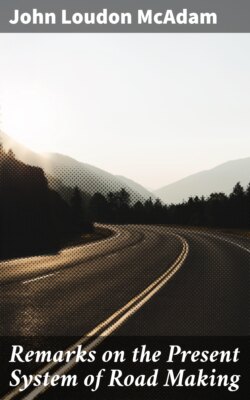Читать книгу Remarks on the Present System of Road Making - John Loudon McAdam - Страница 12
На сайте Литреса книга снята с продажи.
PRICES.
ОглавлениеThe price of lifting a rough road, breaking the stones, forming the road, smoothing the surface, cleaning out the watercourses, and replacing the stone, leaving the road in a finished state, has been found in practice to be from one penny to two-pence per superficial yard, lifted four inches deep; the variation of price depends on the greater or lesser quantity of stone to be broken.
At two-pence per yard, a road of six yards wide will cost, therefore, one shilling per running yard, or 88l. per mile.
Any rough road may be rendered smooth and solid at this price, unless it be weak and require an addition of stone, or require some very material alteration of shape.
Breaking stone has been reduced in price by the use of more proper hammers, and the sitting posture.
The Commissioners at Bristol used to pay fifteen pence per ton for limestone from Durdham Down, for the use of their roads, and broken to a size above twenty ounces.—Stone is now procured from the same place, broken so as none exceed six ounces for ten-pence per ton! and the workmen are very desirous of contracts at that rate, because the heavy work is done by the men, the light work with small hammers by the wives and children, so that whole families are employed.
In Sussex, the proportion is greater between former and present prices; the breaking of flint cost at one time two shillings per ton, and is now done, by introducing a better method and fitter tools at one shilling per ton.
By a more judicious preparation and application of materials the quantity of stone consumed in roads is decreased, by which a great saving of expence is made, and with this great advantage, that the saving is in horse labour of cartage, while the labour price is given to men, and in such a manner as includes boys from the age of ten upwards, women and old men past the age of being able to labour hard. The proportion of men and horse labour in the Bristol district, under the former management, was
One-fourth to men’s labour,
Three-fourths to horse labour.
Under a better system of management the proportion has been exactly reversed: during half a year that an exact account was kept, there was paid.
| For men’s, women and children’s labour, | £3088. |
| For horses’ labour | 1035. |
This immense advantage is presented in every part of the country, as roads are confined to no particular place, and are universally in want of repair: ample funds are already provided for every useful and proper purpose, although at present misapplied in almost every part of the kingdom, while the labourers are in want of that employment which it ought to afford them.
